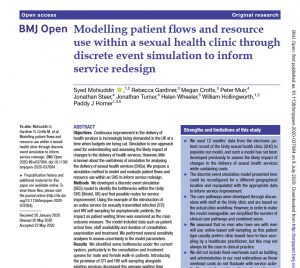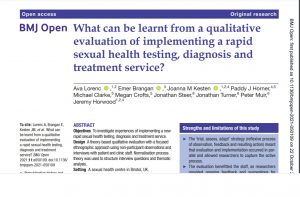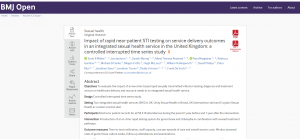Evaluating Unity Sexual Health rapid results service
Demand for HIV and sexually transmitted infection testing is on the rise, but local authority budgets for sexual health services are shrinking. Unity Sexual Health provides sexual health services for Bristol, North Somerset and South Gloucestershire. They redesigned their services to improve access and delivery of care, while remaining cost-effective.
Traditionally, patients had to wait over a week for chlamydia and gonorrhoea test results, and then had to return to the clinic for treatment. Unity introduced a new service where patients drop off their samples which are then checked with new rapid testing equipment, so that results, treatment and advice can be given within hours. As most sexual infections don’t cause any symptoms, early detection and treatment can help stop infections spreading and prevent serious disease developing.
Project aims
We collaborated with Unity Sexual Health to evaluate the changes to the Unity Central Health Clinic service. This project had four parts:
- Using computer modelling to analyse the flow of patients
- Interviewing patients and staff to understand their experiences and views
- Looking at data from before and after the changes, to see how the new service affects the cost and delivery of care
- A health economics evaluation to understand if the changes offer good value
What we did
For the computer modelling part of the project, researchers developed a discrete event simulation (DES) model to analyse the flow of patients within Unity Sexual Health and find possible ways to improve the services Unity provides. This identified bottlenecks in the consultation and treatment queues for walk-in patients.
In the interview study, the research team interviewed 26 patients who used the service in Bristol, and 21 staff working in the service, to find out their experiences and views. They also spent 40 hours observing the day-to-day running of the new service.
For the data analysis part of this project, researchers looked at the time it took to notify patients about test results, as well as the rates of gonorrhoea cultures (swabs sent for additional testing), examinations, follow-up visits, staff capacity and general costs.
They analysed these across a period before and after the new service was implemented. They used statistical models to assess how these outcomes changed and to what extent those changes were due to the new service.
The research team then used this data to assess if the costs of delivering the service had also changed. They did this to understand if the changes they were seeing offered good value for money while maintaining or improving the standard of care.
What we found and what this means
Computer modelling study
Unity introduced an online self-sampling service for sexually transmitted infections (STIs) and human immunodeficiency virus (HIV) in June 2017. Modelling this new service alongside existing services showed that the average waiting time for all patients decreased to 88 minutes from 128 minutes.
Self-sampling also reduced the cost of staff time for managing each patient to £72.64, compared to £88.74 under the same system but without self-sampling.
Interview study
Patients valued the faster results, infection-specific treatment and avoiding unnecessary treatment. The rapid results meant that patients could be treated based on their test results, rather than being prescribed antibiotics ‘just in case’ of infection. Staff welcomed being able to provide treatment based on results and both staff and patients valued avoiding unnecessary antibiotic prescribing. Most patients accepted the need to attend the clinic to drop samples off and return for a follow-up appointment.
The rapid testing service was successfully implemented despite funding and staff shortages. Setting up the new service required co-ordinated changes in practice across multiple teams.
Several small ‘pilots’ of process changes were necessary to find workable options. This responsive operating mode created challenges for delivering comprehensive training and communication in advance to all staff. Engaging all staff and changing ingrained behaviours caused some difficulties. Inevitable teething glitches were resolved and, overall, staff worked together to adjust and improve the new service, and morale was buoyed through observing positive impacts on patient care.
Interviews and observations revealed benefits of the new rapid results service including:
- reduced patient anxiety due to faster results and treatment
- being able to see more patients
- boosting staff job satisfaction as many were excited about doing something new to improve service access
The ARC West evaluation benefitted the staff, as researchers provided ongoing rapid feedback which prompted suggestions for service improvements and provided a space for reflection. Early evaluation of pilots of process changes played an important role in the success of the service, by rapidly feeding back issues for adjustment.
Data analysis
The time it took to notify patients of their test results decreased from more than a week to about a day, once the service had been in place for around six months. This means patients got the right treatment faster.
The rate of gonorrhoea cultures also decreased considerably with the new service, which meant that unnecessary testing was avoided.
Economics evaluation
The average cost of caring for an individual patient went down by 7.5% and the overall cost of running the service went down by 4.7%. This shows that a rapid testing service can be cost effective to implement.
What next?
These findings provide valuable information for policymakers and healthcare professionals across the UK who may be interested in setting up similar rapid services:
- Consult with patients when redesigning services
- Involve all staff in planning, design and implementation
- Protect staff time for meetings and actions
- Document new pathways and processes early and comprehensively disseminate to staff
- Conduct pilots with a small group of staff and patients
- Use varied methods of communication about service changes that are sensitive and supportive
- Consider the impact on different staff roles and ensure staffing capacity to cover changes
Papers

Modelling patient flows and resource use within a sexual health clinic through discrete event simulation to inform service redesign
Read the paper
What can be learnt from a qualitative evaluation of implementing a rapid sexual health testing, diagnosis and treatment service?
Read the paper
Impact of rapid near-patient STI testing on service delivery outcomes in an integrated sexual health service in the United Kingdom: a controlled interrupted time series study
Read the paperLead collaborators
- Dr Patrick Horner, Unity Sexual Health
- Dr Suneeta Suni, Royal Sussex County Hospital, Brighton and Sussex University Hospitals NHS Trust
ARC West Staff
Dr Joanna Kesten
Senior Research Fellow, Qualitative ResearchProfessor Frank de Vocht
Applied Data Sciences Team Co-leadPartners on this project
University Hospitals Bristol and Weston NHS Foundation Trust
University Hospitals Bristol and Weston NHS Foundation Trust is a dynamic group of hospitals in the heart of Bristol and Weston-Super-Mare, with over 100 clinical services across ten sites. They offer care to the people of Bristol, Weston-Super-Mare and the South West, and have an international reputation for cardiac surgery, paediatric services, oncology and bone marrow transplantation. They are the largest centre for medical training and research in the South West.

